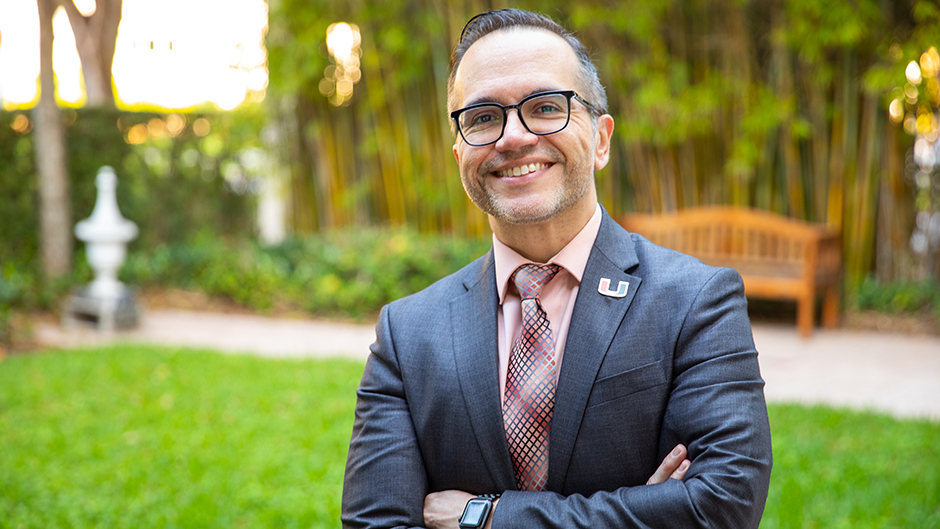Guillermo J. “Willy” Prado, M.S. ’00, Ph.D. ’05, wears many hats at the University of Miami. As vice provost for faculty affairs, dean of the Graduate School, and professor of nursing, public health, and psychology, he brings a unique set of skills, strengths, and sensitivities to all these roles.
Prado’s is a true made-in-Miami success story: he is a first-generation college graduate, the child of immigrants, who worked his way into a leadership role at the University, and who deploys his multifaceted skill set to broaden its intellectual horizons.
Born in Mexico City to a Mexican father and a Cuban mother, Prado grew up in Miami from the age of four, when his family moved here.
“I consider myself very bicultural,” he said. “Although I adapted quickly to the American culture and adopted a lot of its parts, I very much retained a lot of my Cuban and Mexican origin in respect of culture.”
After earning his bachelor’s degree from the University of Florida, Prado returned to his hometown to take a master’s in statistics and a doctorate in epidemiology at the University of Miami. His employment with the University began in 1998, when he was a student worker; he was hired to the staff in 1999 and has been on the faculty since 2007.
A chance meeting when he was a master’s student led Prado into his career in academia.
“I thought I was going to be a statistician, working with the U.S. Census Bureau,” Prado said. Then he met Daniel J. Feaster, Ph.D. ’00, professor in the Department of Public Health Sciences at the Miller School of Medicine, who was a doctoral student at the time.
Feaster convinced Prado to work with him as a research assistant, analyzing data for an HIV project he was conducting. He also helped Prado, who was the first in his family to graduate from college, make connections, and navigate the system—becoming a good friend, mentor, and colleague in the process. After a while, Prado was ready to take the next big step.
“I remember at some point telling Dan, ‘No offense to you, but I’m sort of tired of working on your grants and other colleagues’ grants, and I want to start working on my own. How do I do that?’ He said, ‘Well, Willy, you really have to pursue a doctoral degree. You have to get your graduate degrees…’ And I said, ‘Okay, so how do I do that?’” Prado laughed.
Prado took the plunge, and his graduate studies led to a fruitful career that encompasses administrative, research, and teaching roles.
As vice provost for faculty affairs, Prado has broadened the office’s focus to include faculty career advancement and professional development, and to incorporate a strong component prioritizing diversity, equity, and inclusion.
“Last year we had a banner year, in the sense that more than 50 percent of the new tenure-earning and tenured faculty were Black faculty,” Prado said, noting that his office, in partnership with all the deans, continues to develop policies and create strategies to ensure that best practices in recruitment and retention of faculty will continue.
As dean of the Graduate School, Prado looks for new ways to support graduate students and expand their professional development opportunities, such as a competition to help hone their research communication skills. In the past two years, the school implemented a bridge funding opportunity for students whose research had been impacted by the COVID-19 pandemic.
“When doctoral students’ research is impacted, what that means is that they spend a little bit more time with us at the University than they had planned,” Prado said. “We provided COVID bridge funding for students who showed the greatest need and showed that their work had been impacted.”
In his role as a faculty member, Prado was the founding chief of the Division of Prevention Science and Community Health at the Miller School, where he and the faculty created two new graduate programs.
Recognized in October 2021 by the National Academy of Medicine for his scholarship in prevention science and for his effective youth- and family-focused HIV and substance abuse prevention interventions, he has traveled to the U.S. capitol to speak on the national impact of substance abuse and addiction.
Prado still has a very active research program, funded by the National Institutes of Health. In partnership with 18 clinics across South Florida, his team has embedded a family-based prevention program designed to promote mental health and reduce suicide among Hispanic youth. Follow-up will assess outcomes, but also whether the program can be sustained after the project ends.
“Our end goal is that these clinics, and the staff of the clinics that are going to be delivering the intervention for the research study, continue to do that in the long term,” Prado said.
Although students have come and gone, Prado’s research staff is the same as when he joined the faculty 15 years ago.
Paying forward the encouragement he received from Feaster and others, Prado now shares the benefit of his experiences by helping minority students pursue graduate studies—work for which he won the Florida Education Fund (FEF) president’s award in 2020.
“I have mentored many of the FEF McKnight Fellows, and actually a couple of them who are now faculty here at the University,” said Prado.
Asked which “hat” he likes best, Prado says that he finds all his roles rewarding. “I can literally count on the fingers of one hand the number of days that I really didn’t have a great day here,” Prado said of his alma mater. “I have enjoyed all of the roles that I’ve been in and am still in. All of the experiences combined have been really electrifying, and really gratifying.”

